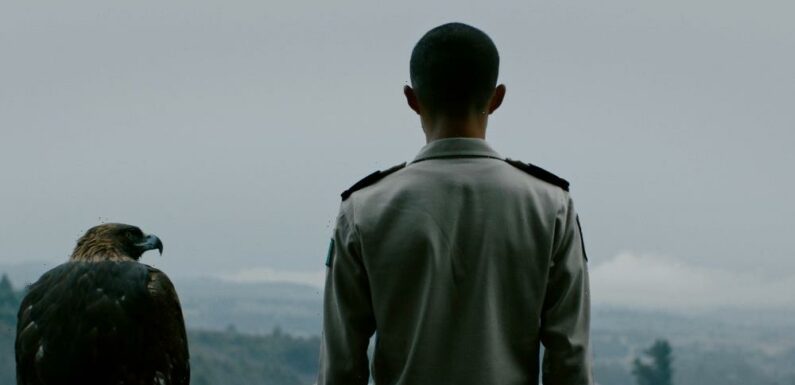
“Workforce,” Mexican writer-director David Zonana’s first feature, world premiered at Toronto in its Platform section, played main competition at San Sebastian and is now hailed as the most prized Mexican film of 2019, nailing Mexico’s moral deficiencies.
Bowing in World Dramatic Competition Jan. 20 at 2023’s Sundance, Zonana’s follow-up, “Heroic,” is produced by Michel Franco (“Workforce,” “After Lucia,” “Chronic,” “New Order”) and sold by Wild Bunch Intl. It’s another trenchant, withering take on modern-day Mexico.
The film’s producers and Wild Bunch Intl. shared an exclusive first look at the poster of “Heroic”with Variety.
Countries are defined by their institutions, Machiavelli argued. If so,”Heroic,” set at the Mexican army’s Heroic Military Academy, the country’s West Point or Sandhurst, underscores that Mexico is in bad shape. Contained in length – a nifty 88 minutes – though large on ideas, it turns on Luis, a Nahuatl, who enlists in Mexico’s Heroic Military College. He encounters institutionalized violence designed to turn him into perfect soldier, though he tries to fight back.
Produced by Franco’s Teorema, with Mexico’s Filmadora and CTT and Rentals and Sweden’s Common Ground Pictures and regional fund Film i Vast, “Heroic” is supported by Mexican Film Institute Imcine Focine investment and Eficine 189 tax break backing. Variety talked to Zonana about his second feature.
Europe and the U.S. were forged by their industrial revolutions and rise of capitalism. A key constituent of Mexico, in contrast, “Heroic” appears to suggest, is its endemic violence, which stretches back to Aztec times.
Mexico suffers an undeniable identity crisis. Since the Spanish Conquest, the Western world has attempted to repress any signs of differentiation, especially Indigenous. Although the the film doesn’t address it directly, you can’t ignore the marginalized state, lack of opportunities, poverty, violence and questions of Indigenous identity when you talk about Mexico’s military. I tried to reflect that in “Heroic.”
Any military academy-set movie bears instant comparison to a dazzling canon of forbears, led by the early stretches of “Full Metal Jacket.” “Heroic” soon develops into a very different proposition.
All film stories have been told, yet all films are unique. I’d be lying if I said that I hadn’t been inspired by cinema’s grand masters who have made army movies. Yet at the same time I tried to tell a specific story, about modern Mexico, its economic and social backwardness, violence and close relationship to that of military institutions. Not only on a macro level but on an intimate, psychological level. Maybe that makes the film special. I hope so.

One subtext, for example, is your passing analysis of why young Mexicans enroll in such a brutal military program. You deliver at least two answers: Poverty and, for Mexico’s Indigenous communities, respect.
Mexico’s militarization permeates its civil society’s daily life. Its social and political relevance is unprecedented. As a society, however, we tend to try to reach conclusions from what we see in the media or on the web: Violence, army-cartel face-offs, human rights abuse. This readily accessible information, though important, is for me just the tip of the iceberg, one side of the coin. The big picture questions can only be understood and discussed if you dig deeper, understanding the roots and humanizing all the people who enlist in the armed forces. What drives them? What were their motives? What was their social and economic state before joining up? What other options did they have? Once these questions are addressed, we can also ask what soldiers, cadets, officers, live through when training. Only this way can we understand and bring to the table in the fullest sense such an urgent issue in Mexico and probably in some other countries as well.
Any such trenchant take on violence and blind obedience needs to be grounded in authenticity. How did you seek to achieve this in “Heroic”?
Mexico’s military institution is really hermetic. Very little information exists. What does is vague and biased. Addressing such sensitive issues for our society — and surely lifting the lid on things that have been hidden — comes with a responsibility. We researched the issues seriously, deeply. I took few liberties. The whole process took time. We came in on the issues from different angles. The most important, undoubtedly, was to gather the testimonies of dozens of people who had served in the military — their experiences and openness to share them proved invaluable. Most characters in the film were played by ex-cadets, ex-soldiers. This aids authenticity and objectivity, both fundamental in the cinema I enjoy and want to make.
“Heroic” confirms some of the stylistic hallmarks anticipated by “Workforce”: Static wide shots, key acts of violence committed off-camera …
Directors gradually find their tone and language. Every creator has a different sensibility. I’m not surprised their are similarities in style between my first and second feature. The question for me is to go on growing, expanding my narrative possibilities, refining my voice. That’s an endless road.
You worked with Michel Franco at Lucia Filma and now Teorema as an associate producer on “600 Miles,” co-producer of “Chronic,” which both premiered in 2015, and as an executive producer on 2017’s “April’s Daughter,” and you’ve spent the last five years writing, directing and producing your first two features. Is this where you see your future?
Beginning my career alongside a figure like Michel has been invaluable for me. As you note, I started off producing and gradually moved into telling my own stories, exploring my creative side and issues I thought relevant. But, at 33, I can’t write off anything, neither any creative media nor collaborations with other creators. I want to go on growing, contributing and generating material that is relevant in the modern world. There’s so much to say.
Read More About:
Source: Read Full Article